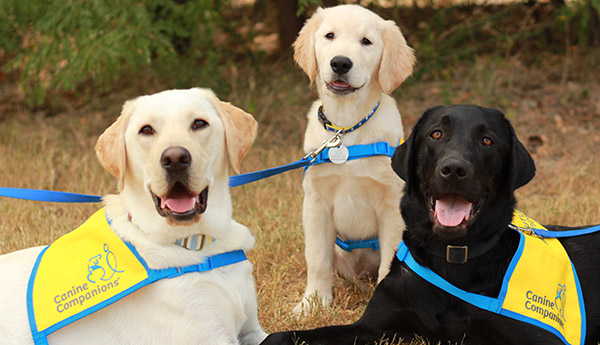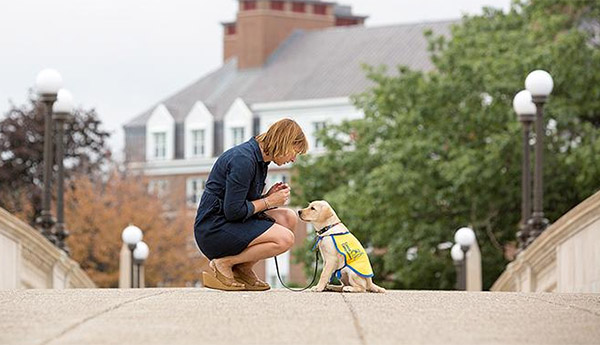Home » Get Involved » Ways to Volunteer » Puppy Raiser FAQs
Puppy Raiser FAQs
Canine Companions has been providing service dogs to people with disabilities since 1975. You can help us unite people with trained service dogs in a powerful program that leads to greater independence. Every service dog starts as a puppy that needs a loving home. You can raise a dog and change a life. Volunteer puppy raising is an incredible way to help children and adults with disabilities live more independent lives.


General Questions
Answer
All dogs in the program are Labrador Retrievers, Golden Retrievers or crosses of the two. All volunteer puppy raisers need to be flexible regarding gender, breed and color to assure that every puppy finds a home quickly and efficiently.
Answer
We have our own breeding program, based at the headquarters in Santa Rosa, California. Puppies are placed from any one of our regional centers and are usually shipped directly to their puppy raiser.
Answer
Puppy raisers must set aside time for daily training and attend puppy classes for the duration of the project. In some areas, we provide puppy classes free of charge. However, if you live in an area without a Canine Companions puppy class available, you must find and attend an approved public obedience class at your expense.
Answer
Puppies need physical activity in the form of play or walking. Puppy raisers should expect to provide at least 25-40 minutes of exercise per day. Canine Companions puppies are not allowed to visit public dog parks.
Answer
The primary puppy raiser must be an adult 18 years of age or older. However, minors are allowed to raise with an adult living in the same home. Note: Puppies can’t attend school with children in the household.
Answer
Absolutely! Most puppy raisers gain approval to take the puppy to work. We recommend speaking to your employer prior to applying. The puppy will need regular toileting breaks throughout the day.
Answer
It’s imperative to the puppy’s development that supervision and socialization are provided throughout every day. Puppy raisers must either have prior approval to bring the puppy to the workplace or provide an alternative for the socialization and care of the puppy during the day. When left unsupervised, Canine Companions puppies should always be in an appropriate size crate.
Answer
In most cases, the puppy can accompany the puppy raiser on vacation, or can be placed with a sitter that meets our criteria. We offer guidelines for age appropriate travel outings and activities.
Answer
Yes, many volunteers will partner with each other to share the responsibility of puppy raising. Starting or finishing a puppy for a minimum of 3 months is also an option. Speak to your puppy program department during your phone interview.
Answer
Puppy raisers are limited to a household of three dogs not including the Canine Companions puppy. All dogs in the home must be well behaved, current on vaccines and over one year of age.
Answer
Each puppy raiser goes through an orientation process and is given a manual, puppy starter kit, puppy classes and online resources, including training videos. We also provide ongoing staff support to each puppy raiser via phone, e-mail or in-person follow-up. There is also a great community of support from current puppy raisers across the country.
Answer
Puppies must be exposed or “socialized” to activities of daily life. This can include accompanying the puppy raiser to the work place, shopping center or other public places. When in public, the puppies wear a cape identifying that they are being socialized for special purposes. However, we rely upon the goodwill of merchants and business owners, rather than the legal system, for gaining public access.
Answer
We believe in the use of positive reinforcement combined with appropriate interruption and redirection. Our puppies are raised by their puppy raisers using Gentle Leaders© or other similar and approved head collars.
Answer
Our staff will work with you to find the best solution for the success of you and the puppy.
Answer
You and the puppy you raise will take a long journey together! It’s only natural that you will become very attached to the dog. The ability to give up a dog comes from knowing that you are raising this puppy for a purpose — that the puppy will go on to help someone with a disability lead a more social and independent lifestyle.
Answer
Canine Companions will make an effort to unite the puppy raiser with the service dog recipient. If an in-person meeting is not possible, we’ll pass along your contact information to the individual matched with the dog.
Answer
Puppy raisers agree to provide food, supplies, vet care, and attend puppy training classes while the puppy is in their care. You will also need to transport the puppy to your regional center at the projected time of turn-in. These expenses are usually tax deductible. Canine Companions is often able to provide assistance for catastrophic veterinary expenses.
Answer
In the event the dog is released from our program but found suitable for a working role with another agency, Canine Companions will transfer the dog to such an agency. Should the dog be unsuitable for placement in any working role, the puppy raiser may adopt the dog as their pet free of charge or Canine Companions will place the dog in an approved home from our released dog wait list. A $1,000 adoption fee applies to everyone other than the puppy raiser of the dog. All homes are limited to no more than two released dogs in the home.
